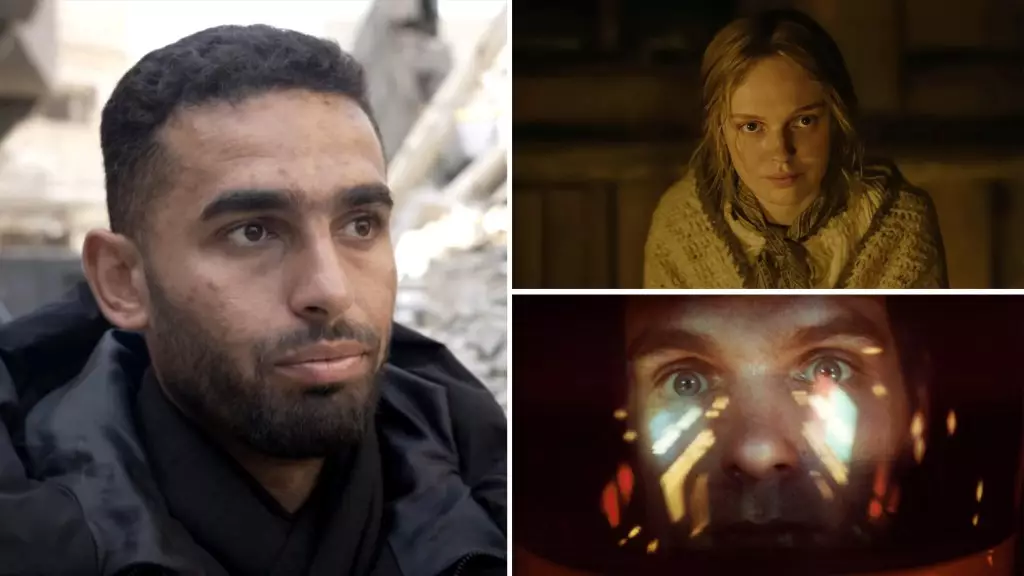With the awards season in full swing, the film landscape is saturated with stories that seek to address significant societal themes, often serving as reflections of our modern world. Among them is “From Ground Zero,” Palestine’s compelling entry for the Oscars that has garnered a shortlist position for Best International Feature. This documentary not only opens this weekend in approximately 70 AMC theaters across major U.S. markets but also in select arthouse venues like the Quad in New York and Laemmle Royal in Los Angeles.
“From Ground Zero” stands out as a poignant series of 22 video diaries capturing the stark reality faced by Palestinian filmmakers during the conflicts in Gaza. Under the direction of Rashid Masharawi, a native of Gaza currently residing in France, the film compiles these personal accounts to highlight the day-to-day struggles of survival, family, and hope among the backdrop of devastation caused by Israeli bombardments.
What sets this film apart is its understated approach to politics. Instead of delving deeply into political commentary, the documentary quietly presents a narrative that focuses on individual resilience and the small, hopeful moments that emerge from chaos. This perspective gives the audience the opportunity to empathize with those living under dire circumstances, humanizing them beyond the typical news portrayal.
Masharawi’s commitment to supporting local filmmakers has also been noteworthy. As the Israel-Hamas conflict escalated, he initiated a fund aimed at facilitating filmmaking in Gaza, showcasing his dedication to creating space for Palestinian voices in cinema. The launch of “From Ground Zero” shortly after the Oscar shortlist announcement was a gamble for both Watermelon Pictures and MPI Media, both of which ventured into competition-heavy markets, hoping to carve out a niche for their title amid the larger studio productions.
The U.S. theatrical debut of “From Ground Zero” is more than just another film release; it represents a crucial opportunity for the stories and lives captured within its frames to reach a wider audience. Masharawi describes it as “an unfiltered window into the resilience, creativity, and humanity of those living through unimaginable hardship.” While the reviews have been overwhelmingly positive, with a 93% critic score on Rotten Tomatoes, the true victory lies in its potential to shed light on untold narratives that often go unheard.
The film’s opening weekend showcases its presence in culturally diverse communities, with venues located in major cities such as New York, Los Angeles, Chicago, and Detroit — areas with significant Palestinian populations. This strategic placement not only broadens accessibility for audiences who resonate with the film’s themes but also serves as a celebration of Palestinian culture and cinema in a global context.
In addition to “From Ground Zero,” the film industry’s current landscape also features intriguing and thematic films like “The Damned,” a horror-thriller set in an isolated Icelandic community dealing with moral dilemmas following a shipwreck. Directed by Thordur Palsson, this film examines the consequences of survival choices under extreme pressure, drawing parallels between existential dilemmas facing humanity in various forms.
As new narratives like these emerge alongside Oscar hopefuls from diverse filmmakers, the industry demonstrates a growing inclination toward storytelling that questions human existence, morality, and societal structures. The influx of poignant films may serve as an acknowledgment of shared struggles, making audience engagement essential.
Adding another layer to this year’s cinematic explorations, New York’s Film Forum is currently hosting a retrospective entitled “From Metropolis to Ex Machina,” focusing on the portrayal of artificial intelligence over the decades. This exhibit illustrates how filmmakers have historically approached themes of technology, often warning us about the darker implications of AI’s integration into society. By examining classics from Fritz Lang’s 1927 “Metropolis” to Stanley Kubrick’s “2001: A Space Odyssey,” the retrospective highlights how cinema has shaped and reflected public perceptions of technology’s place within our lives.
Bruce Goldstein, the program’s director, cleverly notes the irony in current AI propaganda, framing it as an ominous reminder of the complex relationship between humanity and technology. As AI continues to permeate various aspects of life, the historical context provided by these films reminds viewers of the persistent anxieties surrounding technological advancements.
The robust offerings of films like “From Ground Zero” and thematic explorations at events such as “From Metropolis to Ex Machina” reveal a cinematic landscape deeply intertwined with socio-political narratives. The importance of storytelling goes beyond mere entertainment; it provides a mirror to our realities, guiding audiences through the complexity of human experiences. As the awards season unfolds, the connection between cultural storytelling and audience engagement will undoubtedly play a central role in redefining the boundaries of contemporary cinema.

